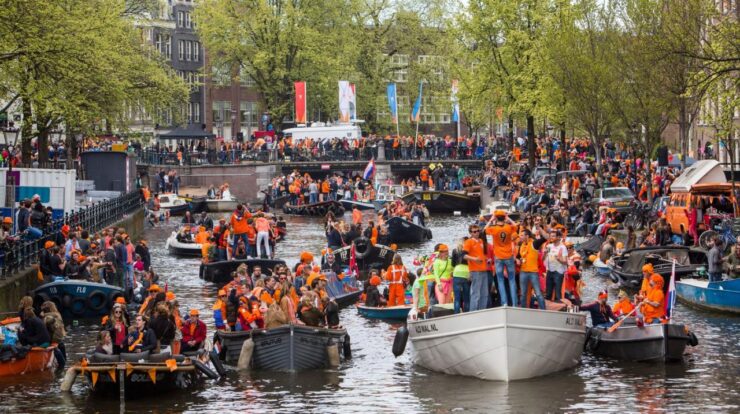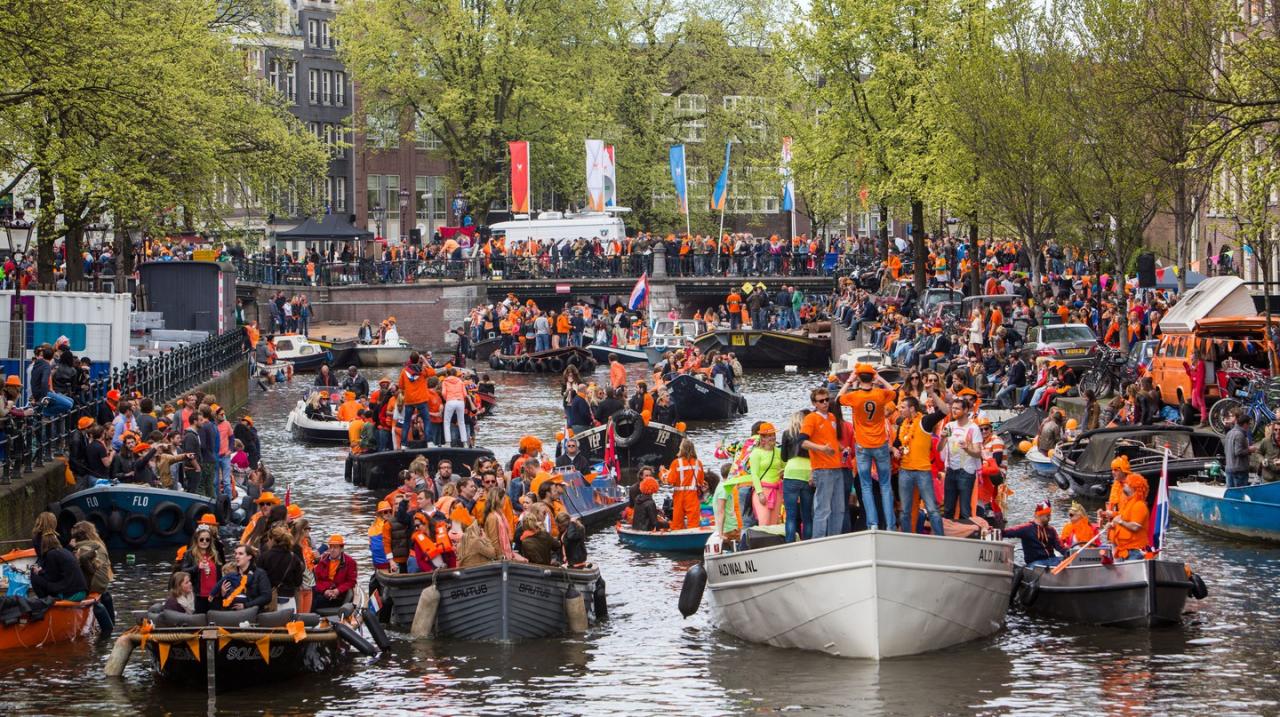
Netherlands King’s Day sets the stage for this enthralling narrative, offering readers a glimpse into a story that is rich in detail and brimming with originality from the outset. This annual celebration, steeped in tradition and cultural significance, paints a vibrant canvas of festivities, economic vitality, and international recognition.
The celebration, held on April 27th, commemorates the birth of King Willem-Alexander and serves as a testament to the deep-rooted bond between the Dutch monarchy and its people. It is a day marked by vibrant orange attire, lively street markets, and a palpable sense of national pride.
King’s Day Celebrations
King’s Day is a national holiday celebrated annually in the Netherlands on April 27th. It marks the birthday of the reigning monarch, currently King Willem-Alexander. The celebration is a vibrant and festive occasion that brings the country together in a spirit of unity and national pride.
The origins of King’s Day date back to 1885 when it was known as Queen’s Day, honoring Queen Wilhelmina. Over the years, the celebration has evolved to include a wide range of festivities, including street markets, music performances, and outdoor games.
The royal family traditionally participates in the festivities, visiting different cities and towns to interact with the public.
Traditional Festivities
- Street Markets:King’s Day is renowned for its vibrant street markets, where vendors sell a variety of goods, from handmade crafts to vintage clothing.
- Music Performances:The celebration is filled with music, with live performances taking place in public squares and streets. From traditional Dutch folk music to modern pop and rock, there is something for everyone to enjoy.
- Outdoor Games:King’s Day is a time for fun and games, with families and friends participating in traditional Dutch games such as “klokken” (bell ringing) and “koekhappen” (cookie eating).
- Orange Attire:The color orange is synonymous with King’s Day, and people dress up in orange clothing and accessories to celebrate the occasion.
Role of the Dutch Royal Family, Netherlands king’s day
The Dutch royal family plays a central role in King’s Day celebrations. The King and Queen, along with other members of the family, visit different cities and towns to participate in festivities and interact with the public. Their presence adds a sense of grandeur and significance to the occasion, strengthening the bond between the monarchy and the people.
Cultural Significance
King’s Day is more than just a national holiday; it is a deeply ingrained cultural event that fosters a sense of national unity and pride. The celebration brings people together from all walks of life, creating a shared experience that strengthens the bonds of community.
The festivities reflect Dutch values of inclusivity, tolerance, and a love for tradition. The vibrant street markets showcase the country’s entrepreneurial spirit, while the outdoor games and music performances celebrate the Dutch zest for life.
Sense of National Unity
King’s Day is a time for the Dutch people to come together and celebrate their shared heritage and identity. The presence of the royal family further reinforces the sense of unity and national pride.
Reflection of Dutch Values
The festivities associated with King’s Day embody Dutch values such as inclusivity, tolerance, and a love for tradition. The celebration is open to all, regardless of background or beliefs, reflecting the country’s commitment to diversity and acceptance.
Economic Impact: Netherlands King’s Day
King’s Day has a significant economic impact on the Netherlands. The influx of tourists and the increase in consumer spending during the celebration contribute to the country’s economy.
Local businesses benefit greatly from the increased foot traffic and sales. Street vendors, restaurants, and bars experience a surge in revenue, providing a boost to the local economy.
Tourism
King’s Day attracts a large number of tourists from both within the Netherlands and abroad. The vibrant atmosphere, unique festivities, and the opportunity to witness the royal family draw visitors from all over the world.
Local Businesses
Local businesses, particularly those in the retail and hospitality sectors, experience a significant increase in sales during King’s Day. The influx of tourists and the festive atmosphere create a perfect opportunity for businesses to boost their revenue.
International Recognition
King’s Day is not only celebrated in the Netherlands but also has gained international recognition. The unique and festive nature of the celebration has captured the attention of people worldwide.
The Dutch royal family has played a crucial role in promoting King’s Day globally. Their visits to other countries and their active presence on social media have helped raise awareness and generate interest in the celebration.
Celebrations Outside the Netherlands
King’s Day is celebrated in various countries outside the Netherlands, including Aruba, Curaçao, and Suriname, which have strong historical ties to the Netherlands.
Role of the Dutch Royal Family, Netherlands king’s day
The Dutch royal family has been instrumental in promoting King’s Day internationally. Their visits to other countries and their engagement with global audiences have helped spread awareness and appreciation for the celebration.
Historical Evolution
King’s Day has undergone several changes and adaptations over the years, reflecting the evolving social and cultural landscape of the Netherlands.
The celebration was initially known as Queen’s Day, honoring Queen Wilhelmina, who ascended to the throne in 1890. In 1948, the name was changed to Queen’s Day to commemorate the birth of Queen Juliana, Wilhelmina’s daughter.
Queen’s Day to King’s Day
In 2013, when Queen Beatrix abdicated in favor of her son, Willem-Alexander, the celebration was renamed King’s Day. This marked a significant change in the tradition, as it was the first time a male monarch had been celebrated.
Changing Festivities
Over the years, the festivities associated with King’s Day have also evolved. In the past, the celebration was primarily focused on traditional Dutch games and music. However, in recent years, the celebration has become more diverse, incorporating elements from different cultures and traditions.
Social Media Presence

King’s Day has a strong presence on social media, with millions of people sharing photos, videos, and updates about the celebration.
The official social media accounts of the Dutch royal family and the Dutch government play a significant role in promoting the event and sharing updates on the festivities.
Hashtags and Trending Topics
The hashtag #Koningsdag (Dutch for King’s Day) is widely used on social media during the celebration. Other popular hashtags include #Oranjefeest (Orange Festival) and #KingsDay.
Online Engagement
Social media platforms provide an opportunity for people to engage with the celebration virtually, even if they are not physically present in the Netherlands. They can share their experiences, photos, and videos, and connect with others who are also celebrating.
Last Word
Netherlands King’s Day stands as a beacon of Dutch heritage, a celebration that weaves together the threads of history, culture, and economic prosperity. Its international recognition and the active involvement of the Dutch royal family underscore its global significance. As the nation comes together to honor its monarch, King’s Day serves as a powerful reminder of the enduring spirit and unity that define the Netherlands.
Expert Answers
What is the significance of orange on King’s Day?
Orange is the color of the Dutch royal family, the House of Orange-Nassau, and has been associated with the monarchy for centuries.
How is King’s Day celebrated in the Netherlands?
King’s Day is celebrated with street markets, music, and other festivities throughout the country. Many people wear orange clothing and accessories to show their support for the royal family.
What is the economic impact of King’s Day?
King’s Day is a major economic event for the Netherlands, with businesses reporting increased sales and tourism revenue.